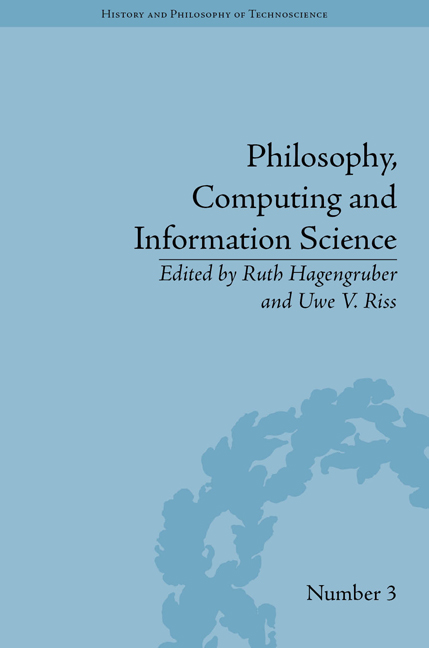Book contents
- Frontmatter
- CONTENTS
- List of Contributors
- List of Figures and Tables
- Introduction: Philosophy's Relevance in Computing and Information Science
- Part I Philosophy of Computing and Information
- Part II Complexity and System Theory
- Part III Ontology
- Part IV Knowledge Representation
- 10 Sophisticated Knowledge Representation and Reasoning Requires Philosophy
- 11 On Frames and Theory-Elements of Structuralism
- 12 Ontological Complexity and Human Culture
- Part V Action Theory
- Part VI Info-Computationalism
- Part VII Ethics
- Notes
- Index
10 - Sophisticated Knowledge Representation and Reasoning Requires Philosophy
from Part IV - Knowledge Representation
- Frontmatter
- CONTENTS
- List of Contributors
- List of Figures and Tables
- Introduction: Philosophy's Relevance in Computing and Information Science
- Part I Philosophy of Computing and Information
- Part II Complexity and System Theory
- Part III Ontology
- Part IV Knowledge Representation
- 10 Sophisticated Knowledge Representation and Reasoning Requires Philosophy
- 11 On Frames and Theory-Elements of Structuralism
- 12 Ontological Complexity and Human Culture
- Part V Action Theory
- Part VI Info-Computationalism
- Part VII Ethics
- Notes
- Index
Summary
What is Knowledge Representation and Reasoning?
What is knowledge representation and reasoning (KR&R)? Alas, a thorough account would require a book, or at least a dedicated, full-length paper, but here we shall have to make do with something simpler. Since most readers are likely to have an intuitive grasp of the essence of KR&R, our simple account should suffice. The interesting thing is that this simple account itself makes reference to some of the foundational distinctions in the field of philosophy. These distinctions also play a central role in artificial intelligence (AI) and computer science.
To begin with, the first distinction in KR&R is that we identify knowledge with knowledge that such-and-such holds (possibly to a degree), rather than knowing how. If you ask an expert tennis player how he manages to serve a ball at 130 miles per hour on his first serve, and then serve a safer, topspin serve on his second should the first be out, you may well receive a confession that, if truth be told, this athlete can't really tell you. He just does it; he does something he has been doing since his youth. Yet, there is no denying that he knows how to serve. In contrast, the knowledge in KR&R must be expressible in declarative statements. For example, our tennis player knows that if his first serve lands outside the service box, it's not in play. He thus knows a proposition, conditional in form.
- Type
- Chapter
- Information
- Philosophy, Computing and Information Science , pp. 99 - 120Publisher: Pickering & ChattoFirst published in: 2014



